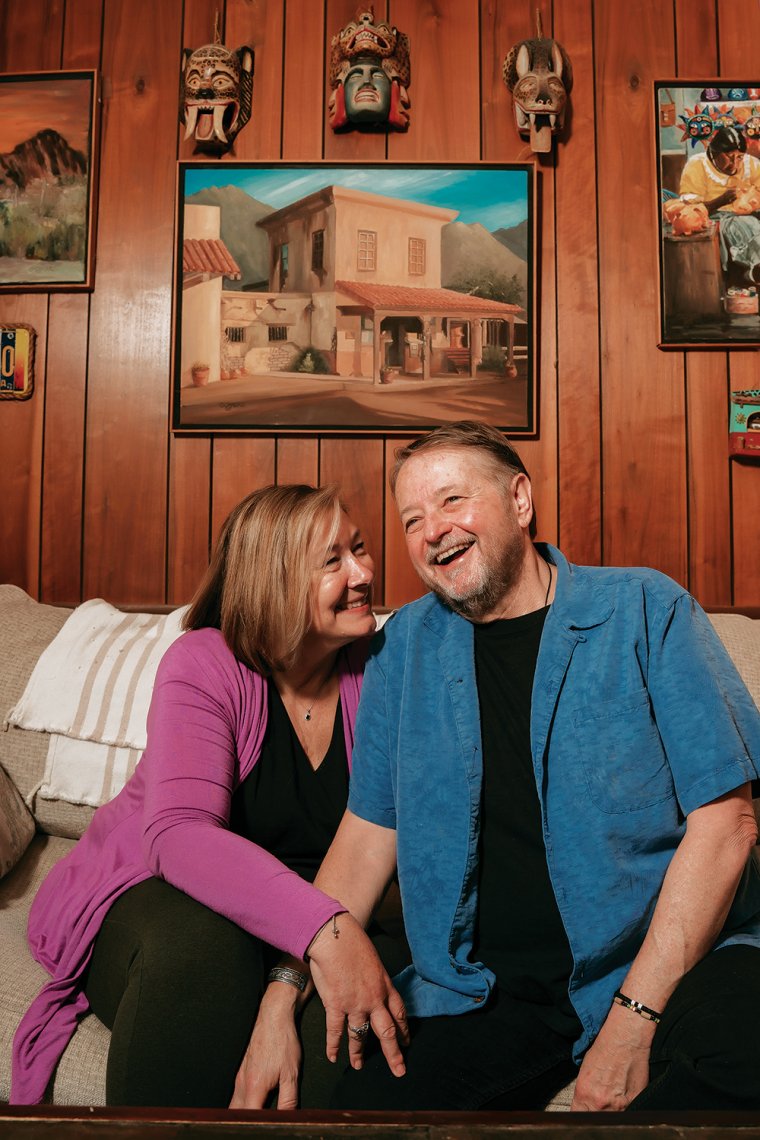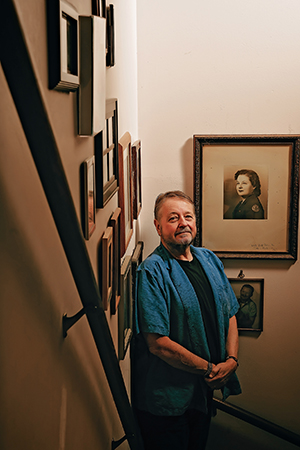Urrea was born in 1955 to Phyllis Irene McLaughlin Urrea and Alberto Urrea, who met in San Francisco and threw in their lot with each other without perhaps thinking things through as well as they should have. Phyllis came from a sophisticated New York City background filled with culture and nightlife; she always called her only son “darling boy” and encouraged him to be as white and Western and culturally knowledgeable as possible. Alberto, often described by Luis as an Errol Flynn look-alike, had different plans for his son, wanting Luis to become as macho and Mexican as possible.

Cindy and Luis Urrea in their home in Naperville, Illinois. (Credit: Emily Melissa)
Both served in the Second World War, and “both of them suffered from PTSD, I now realize,” says Urrea. “At night, when I was growing up, my father would be in one bedroom with nightmares, grinding his teeth until they all cracked, and my mother would be in another bedroom shouting and kicking and crying through nightmares. They both suffered, but they couldn’t communicate about that suffering.”
He says that as he got older, his mother “got crazier and crazier, and more and more unhappy. There would be moments of the old Phyllis, when she might gesture with her hand bearing a large topaz ring and holding a cigarette, say something witty and effervescent, flick a bit of tobacco off her lip....”
Alberto Urrea kept their small family “very isolated,” Luis says. “My mother never drove again after her Clubmobile experiences, and it was easy to cut her off from family and friends. He had the car and he’d leave, and he was cheating on her and she found out. They were locked in this hopeless battle. I found out later that her family had tried to reach out to her for decades, but she remained kind of opaque, behind a wall of fog.”
Luis Urrea knew his mother had a story, but he didn’t know how to tell it. Then Cindy Urrea read a book that was revelatory, both for the research side and the writing side. “The coolest thing about this book for me is that it came from the women telling their own stories,” says Cindy. “We couldn’t find any historical record. We couldn’t find any facts and figures. We couldn’t find anything like that.” But then she read Svetlana Alexievich’s The Unwomanly Face of War: An Oral History of Women in World War II, translated by Richard Pevear and Larissa Volokhonsky and published by Random House in 2017.
“That’s the one that changed everything,” she says. “Some of the stories about the Soviet women who enlisted were so much like the American women. The Soviet woman who brought a suitcase full of her favorite chocolates and the American woman who brought all of her evening dresses because she thought that’s what ‘entertaining the troops’ meant.”
But there’s a much more serious and dark side that Cindy realized after listening to Luis’s stories about his mother’s sadness. “PTSD takes different forms for women, and it’s taken us too long to acknowledge that. When Luis told me about his mom’s service I said, You know what? Phyllis gets a free pass for everything. Every day your job, as a Clubmobile operator, is to listen to these boys. They’re boys! These women saw planes go up and some didn’t come back.”
She continues: “Just knowing that you are the last bit of home that Bobby Jones from Oklahoma is ever going to see. So you better not ever be in a bad mood. You always smile and serve a cup of hot coffee and a hug. Because you’re saying goodbye to him. You’re standing in for the world.”
“I couldn’t believe there was no historical record about these women,” says Cindy. “I kept coming up against brick walls. But the Alexievich book opened something up for me that I was able to share with Luis. When these women came back, no one was interested in their stories—but they weren’t interested in telling them, either. They didn’t consider themselves stars of the show.”
For some time, Urrea worked on a book that he says was about a “gray, sad ghost of a woman” that didn’t work, although his longtime agent, Julie Barer, refrained from telling him so. “She would just nod and encourage me to keep going, even though we both knew I wasn’t getting it.”
It wasn’t until 2014 that Luis and Cindy Urrea found Phyllis’s Clubmobile partner and closest friend, “Darling Jill,” that the story morphed significantly. Jill Pitts Knappenberger happened to live near the Urreas, in Champaign-Urbana, Illinois. When they got in touch with her and requested a visit, she welcomed them into her life and her home and loads of memorabilia: clothing and knickknacks covered in patriotic symbols, all of Phyllis’s letters to her, her own diaries—and a tiny gold Clubmobile charm on a gold chain “that she never took off,” says Cindy. “They weren’t considered veterans. Jill never got over not being able to take advantage of the GI Bill.”
Darling Jill was able to show Luis Urrea the side of his mother, Phyllis, that he had never known, and that enabled him to write the kind of book he had never written, a women’s war story that takes no liberties with the history of the central conflict and manages to illustrate how differently war affects women, both during and after.
![]()
Luis Alberto Urrea has had a particular and important job in the literary world, that of telling the stories of the border. He has been telling stories of Mexican Americans since his first book, Across the Wire, was published in 1993, and he is still telling those stories. One of his best-known quotes is “Fill your pen with compassion, or don’t pick it up,” and he clearly felt, for decades, that he had a responsibility to the people among whom he had lived and worked to share and shape their stories with compassion. “It’s a political act to go into Mexico and face poverty and disease and danger and heartbreak, to give the kind of love God would call you to give to people who on the surface might be unlovable and certainly are forgotten,” Urrea says.
He continues: “Well, isn’t that the same story in war? Those grunts. Those GIs. The soldier who confesses he kissed another male soldier on the mouth. The guy who was so scared that he actually defecated in his pants and is too ashamed to come near my character Irene. She’s the last person on earth who should be washing shit out of a guy’s pants, but she does it because it’s an act of love. It’s an act of service. She’s there to do her job, and that becomes a beautiful political act. It wasn’t any kind of genius on my part. It just kept happening, organically, that people who were in dire straits reached out to each other.”
Urrea says he had a lot of stories he needed to finish before he could write about his mother, and not simply because he was wary of “splashback” about writing from the perspective of a white woman. “My mother’s story was always percolating in the background,” he says. “But finally I understood that borders separate us all constantly. Feelings keep us separated. When I realized that my poor mom was trapped behind a wall she didn’t know how to breach, I finally saw her.”
The Urreas took several research trips, including two to Europe, to fully understand the overall experience of the Clubmobile women and the specific wartime life of Phyllis Urrea. “For me, concrete things speak loudly,” says Urrea, who is sitting near a sculpture of a coyote on a motorcycle that represents one of the book’s soldier characters. “When we went to the airfield where Phyllis and Jill’s plane took off for France, the manager took me on a walk down the runway. He bent down and pulled a piece of tarmac from the grass and said, ‘This is the original. You better take it because your mom might have stood on it.’” His eyes fill with tears. “You know, when your parents are dead and gone so long, to be suddenly given a little piece of trash that is an unexpected connection to one of them…. It’s on my desk now. I see it every day.”
He looks up and to the right. “It is witness. But this is the key to everything I do. It’s the literature of witness. That’s what I care about. And isn’t it stunning to see that you don’t understand enough about your own parent to witness their story?” Urrea says he could write about his father because he was killed, because when he went to bury his father he had all his Mexican family with him to recall his father to life. “But my mom’s story was kind of sealed. It was a secret, put away.”
Darling Jill had part of Phyllis’s story but not all of it. “I realized every one of those women’s stories is a secret,” says Urrea. “Even Jill, who was open and sunny and sharing with us, she had an absolute border you could not cross.”
Cindy adds, “My favorite part of watching this book come about was watching Luis on the couch in Miss Jill’s apartment as she introduced him to his own mom. I would just sit there trying not to cry, because she knew Phyllis when she was at her very, very best. I don’t know that Luis ever met that Phyllis. To watch him meet that Phyllis through Jill was the magic about this novel for me.”
Luis nods and says, “Mom brought the joy sometimes, but I only saw it in little eruptions, like when we saw the movie Patton eight times. She’d met General Patton ‘over there’ and revered him, and when she watched that film she was back to her wartime best self.”
The “magic key” that Jill Knappenberger gave to Luis was showing him that his mom brought the joy around the clock. “Jill made it very clear that my mother was delight on two legs, something I could not fathom. I thought my mother was a very strange character. When Jill said, ‘Your mother brought the joy,’ that was one of those moments that changes your life forever.”
![]()
In 2022, while Little, Brown editor Ben George was working on editing the manuscript of Good Night, Irene, Luis and Cindy Urrea were looking forward to their last research trip for the book, which would take them from England to Germany. In February they learned that Luis had cancer that would need to be aggressively treated by surgery.
Luis’s hand strays to his throat. “You have cancer surgery and you leave for a long trip,” he says. “I have pictures of myself with these gauze pads hidden under my shirt collar because I was bleeding. I don’t know how to put this, but it was my first brush with the shadow of mortality.”
Now fully recovered, he nevertheless thinks experiencing the scare was a good thing for this book. “All of my dearest and closest best friends had died,” he says. “I was ready to understand that we are given a limited moment here on earth.” Being forced to consider the brevity of human life also brought him closer to his book’s inspiration. “When we went to England and saw the village where my mother and Jill and the other Clubmobile women were billeted, at one point I saw that I was staring up at a window my mother had once looked out of, in a picture we have. In another picture she’s looking at a graveyard we walked in. Things that we saw while thousands of miles from home made me feel closer to my mother than I ever had.”
Luis Alberto Urrea laughs. “Once we’d walked the runway where their plane took off for France, once we’d visited Buchenwald, I thought, my mom was a badass. I tell my audiences over and over, you should rethink the old gray women in your life that you take for granted. My mom’s own madness wrecked her. But you try and you try to give something back, and in this book, I finally gave my mom a happy ending.”
Bethanne Patrick is a critic, the host of the Missing Pages podcast, and the author of the memoir Life B: Overcoming Double Depression, published by Counterpoint Press in May. She teaches creative writing at American University and serves on the board of the PEN/Faulkner Foundation.
Correction: An earlier version of this profile stated that Luis Alberto Urrea was a finalist for a Pulitzer Prize in Fiction for The Hummingbird’s Daughter; in fact, Urrea was a finalist for the prize in nonfiction for The Devil’s Highway: A True Story. The text has been updated to reflect this correction.









